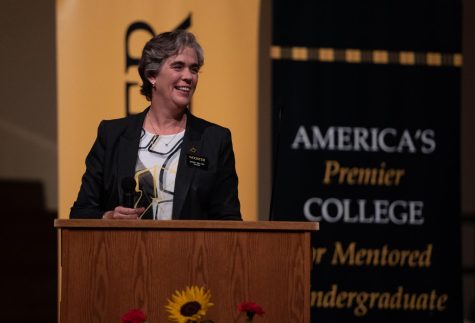Shrinking History Department Adjusts For Upcoming Year
September 23, 2018
Professor David Schmitz’s departure from Whitman College last year left the History department understaffed and missing an important area of expertise. Schmitz specialized in American foreign policy and 20th century US history, some of the most popular history courses on campus.
“[Enrollment in history and the humanities has] gone down nationwide in the last 10 years,” History department chair Professor Brian Dott said. “Yet our classes which are almost always full and have the highest enrollment are Modern, 20th, 21st century United States history classes.”
Schmitz’s vacated position was cut after Whitman’s Board of Trustees asked for fewer tenured staff positions in an attempt to raise the student-faculty ratio to 10:1.
“As of a couple of years ago, the board of trustees … looked at the student-faculty ratio that had gone from 10:1 a few years ago to 8:1 in recent years and made the conclusion that that wasn’t a tenable position for the college to be in,” Faculty Chair and Mathematics Professor Barry Balof said. “We had other financial priorities around affordability, around diversity, equity and inclusion, that needed more attention than maintaining the size of the faculty.”
While staff recognizes this need, the process of choosing which positions to keep upset some staff and students.
“I am completely sympathetic with the fact that thinking long term the college needs to invest more money in student financial aid. What I’m not so sympathetic in is the mechanisms with how we’re doing that,” Dott said. “I think it could be done with much more strategy and planning and not being mostly dependent on who’s retiring.”
Sophomore History major Rhone Grajcar agrees.
“I think [raising the student to faculty ratio is] a fine goal, especially if that’s a decision that the college thinks is necessary financially,” Grajcar said. “But I guess cutting American history is probably the last thing that I would’ve cut.”
For Grajcar, American history is an essential part of a college curriculum, especially at a school that receives federal funds.
“Whitman is a private school, but it still receives various subsidies and [is also] tax-exempt,” Grajcar said. “I think that we have the responsibility to the government to be educating people on the history of that government and how they interact with it.”
History is not the only department with staffing gaps.
“There are other positions across the college that we would see as essential components of a small liberal arts college,” Dott said. He is particularly concerned with gaps in the Classics and Art History departments following recent retirements. “We need to look broadly across the curriculum and make sure we’re not losing pieces that, even though they may not serve a lot of majors, are really important in terms of intellectual environment of what it means to be a liberal arts college.”
The Committee of Department Chairs, CDC, tasked with reviewing department position applications and making recommendations to the provost, acknowledges the issues in their process thus far.
“The CDC admits that it could’ve been a broader process than just departments submitting [position applications], the CDC deciding,” Balof said. “We needed to have more conversations around where our priorities lied and that all faculty needed to engage in those conversations … because the curriculum works as a whole.”






